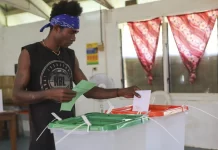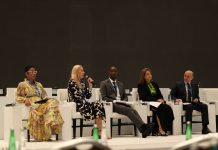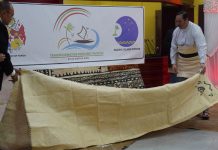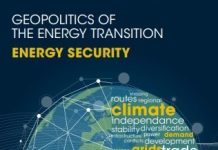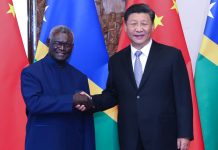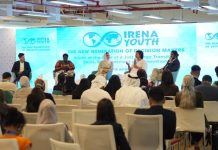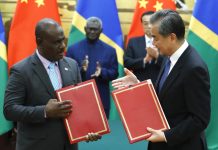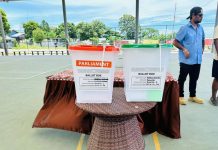In the wake of last month’s Pacific Islands Forum in Fiji, Professor Steven Ratuva looks at the historical, political and ideological challenges that are undermining and tainting the mana of the Pacific.
By Steven Ratuva
The free-flowing New Zealand pinot noir, the multicoloured Fijian bula shirts, the radiant Pacific smiles, the “family” photo sessions, the brotherly and sisterly bear hugs, and the unifying narratives of a common Pacific purpose. These were all part of the well-crafted public imagery of the Pacific Islands Forum special leaders retreat in Nadi, in February.
Well-crafted? Yes, indeed. That’s part of the modern culture of political and professional image construction and propagation to make leaders look good, happy and useful as a way of connecting favourably with their domestic voting public as well as selling a good image of their countries to the international audience.
In its attention to these matters, I wouldn’t hesitate to give the forum leaders meeting an A+.
But, barely concealed beneath the diplomatic aura of calmness, happiness and the public show of political solidarity, there are layers of disgruntled sentiments and unhappy voices which have already caused trouble and have the potential to spark more turbulence.
In response to one of these regional problems, Fiji’s prime minister, Sitiveni Rabuka, the outgoing chair of the forum, had been entrusted with the peacemaker role, which saw him jetting off to Kiribati, compliments of the Australian government, to try to woo the unhappy Taneti Maamau, Kiribati’s president, and persuade him to re-join the forum leaders’ meetings.
The background to the story is a bit more complex.
Maamau had refused to sign the Suva Agreement and threatened to pull Kiribati out of the forum in 2022. The Suva Agreement, which Frank Bainimarama, the former Fijian prime minister, had facilitated, was meant to appease the Micronesian countries (Marshall Islands, Federated States of Micronesia, Nauru, Palau and Kiribati), after they’d threatened to withdraw from the forum in protest at the selection of a Cook Islander, Henry Puna, as the secretary general (SG) of the forum.
The Micronesian group argued that the appointment went against the spirit of the “gentleman’s agreement” by forum leaders to rotate the role among the three major sub-regional groupings: the Melanesian Spearhead Group, Micronesian Chief Executive group and Polynesian Leaders group. As the last two SGs were from Melanesia and Polynesia, they felt that the next one should’ve been someone from Micronesia — but instead Puna was chosen.
With Kiribati on board again, the Forum moved quickly to diffuse the situation in Nadi by offering the next SG position to the former president of Nauru, Baron Waqa.
This incident is an example of the underlying historical, political and ideological challenges which are shaping regional dynamics and, in particular, of the way these challenges have undermined and tainted the mana of the Pacific.
One such challenge is the uneasy relationship between regional agendas and national interests. National and local interests have often taken precedence at the cost of regional coherence and relationships.
This is because some governments expend much of their energy and resources trying to survive in an environment of dynamic economic, political, social and cultural tensions. Mindful of their perpetuity, national leaders and politicians are often worried about the changing nature of their local electoral support, and the implications for their political survival.
In countries such as Vanuatu, Solomon Islands, Tonga and Papua New Guinea, votes of no confidence are common, and some governments last only for a few months. Local issues such as increasing poverty, youth unemployment, escalating crime rates and climate change-based disasters have captured the focus of leaders away from regional issues.
As a result, regional initiatives which are meant to be implemented at the national level are sometimes overshadowed by local interests. This creates a large gap between local people’s aspirations and expectations and the Pacific regional mana, which has become a distant ideal.
A related issue is the decreasing significance of a regional boundary and identity as a result of the redefinition and expansion of the Pacific through social media and other forms of digital communication.
The new Pacific virtual boundary has a global reach and identity beyond the traditional Pacific geographical boundary, as families, groups, individuals and organisations connect with each other on a daily basis.
Subconsciously, people redefine their sense of place either in relation to the local or the global, and the regional no longer has as much significance as an identity framework as it once did. The fear is that the trend will intensify with the new generation of global-minded young people dismissing the regional Pacific mana altogether.
A third issue is the increasingly negative framing of the Pacific as a site of foreign power contestation. Regional geopolitics and associated geostrategic and militaristic narratives — such as Pacific pivot, Indo-Pacific, AUKUS (the pact between Australia, the UK and the US to keep China in check), QUAD (a geostrategic agreement between Japan, Australia, India and the US) and the Chinese Belt and Road initiative — have created an atmosphere of external power rivalry and insecurity. This has given regionalism a politically unpalatable and toxic connotation, and undermined the sense of Pacific mana.
As a result, many Pacific people have simply ignored the broader regional big-power arm-wrestling and have become inward-looking, focusing on local and national issues.
A fourth issue is that, in a region where Australia and New Zealand have carved out their own geopolitical spaces, power and influence are further stratified into a hierarchy where the Pacific Island states increasingly find themselves at the bottom of the pecking order.
Pacific Island countries are left out of the major regional alliances, and are only “invited” to join in a Hollywood-style supporting role to provide legitimation. This, too, has undermined the sense of significance and mana of the Pacific states and people as the original guardians of the Pacific, an ocean traversed by their ancestors centuries ago, well before Europeans ever set foot in this part of the world.
The final issue is much deeper and, ironically, something not many Pacific peoples want to hear. That’s the colonial legacy that still ripples across our sense of identity and political consciousness in a profound way.
The sub-categories of Melanesia, Micronesia and Polynesia — Eurocentric constructions which were inspired by the racialised categorisation of humanity by European scholars in the 1800s — still linger in our collective consciousness.
These categories artificially cut across the complex and fluid cultural and genetic admixtures that exist from west to east and north to south, right across the Pacific. And they hinder any attempt to create a united Pan-Pacific entity, as countries try to define their identity within the parochial confinements of sub-regional boundaries.
Subconsciously, we’ve used the colonial cultural templates to define who we are. Not only have we accepted these colonial racial profiles religiously, we’ve also built political sub-regional constructs around them, such as the Melanesian Spearhead Group, Micronesian Chief Executives Summit and Polynesian Leaders Group.
Once the political and ideological foundation for identity fragmentation is set in stone, all it takes are differences on issues, such as the appointment of the forum SG, for a full-blown regional division to arise, once more undermining our Pacific mana.
It’s time to decolonise these artificial categories and boundaries and reframe ourselves as people of the vast trans-Moana universe, whose cultural boundaries aren’t defined by imposed Eurocentric categories but by a collective sense of belonging to the ocean through interconnected constellations of cultures and people.
This means doing away with racially based sub-regional categories and replacing them with more inclusive connections founded on sustainability-based, socio-economic, non-racialised, and trans-Oceanic aspirations.
Despite these challenges, there are rays of hope as a new generation of Pacific thinkers, activists, artists, musicians and professionals are reimagining and redefining the Pacific in transformative ways. We see this in the areas of climate change, art, development, research, education, gender rights, equity, diversity and ocean sustainability.
Although some of the new modes of thinking may be in conflict with the old Pacific order framed under “the Pacific Way” concept of the 1970s, they do offer a new vision which can be enriching for all of us.
Today, Pacific regional identity is becoming more multi-layered and global — and is expressed in both the virtual and social realms.
The virtual networks which connect families around the world have made the Pacific a planetary rather than just a regional discourse. Yet, in the middle of these waves of social transformation, people still hold on to their Indigenous way of being, although often in a redefined form.
For instance, the use of the Indigenous reconciliation strategy by Sitiveni Rabuka to re-engage Kiribati in the forum, and the offering of a traditional apology (matanigasau) to the forum leaders during the Nadi meeting, for Fiji’s naughty political behaviour over the years, shows how the mana of ancestral wisdom still rings loud across the ocean.
Despite the dramatic changes, the challenge is to put Pacific mana and voices back into regional politics, climate change, education and development, which have been overshadowed by overwhelming external forces such as big-power cultural and economic influence and rivalry.
As the contest over who “owns” the Pacific increases in tempo, Pacific people should stake their claim in their ocean, and make this sense of ownership known, acknowledged and respected by the marauding big powers, whose interests have typically been to use, exploit, extract, and then leave.
Only then can we ensure that our voices and mana are protected.
SOURCE: E TANGATA/PACNEWS


